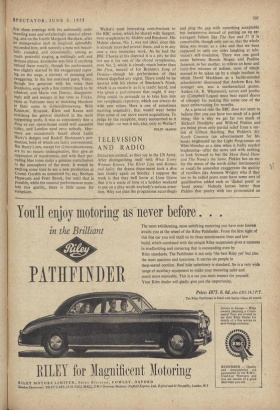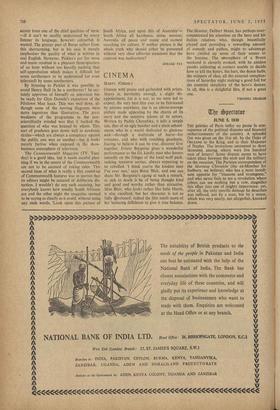TELEVISION AND RADIO
COLIN MASON
SITUATION normal, as they say in the US Army. After distinguishing itself with What Every Woman Knows, The River Line and Romeo and Juliet, the drama department took a dive into fatuity again on 'Sunday. I suppose the truth is that they well know at Lime Grove that it is a waste of time at a holiday weekend to put on a play worth anybody's serious atten- tion. Why not plan the programme accordingly and plug the gap with something acceptable but inexpensive instead of putting on an ex- travagant failure like The Sun and 1? It is conceivable, though only just so, that the whole thing , was, meant as a joke and that we were supposed to split our sides laughing at tele- vision's self-revelation. There was one good scene between Brenda Hogan and Pauline Jameson, as her mother, to relieve an hour and forty-five minutes of tedium, most of which seemed to be taken up by a single incident in which David Markham as a feeble-minded schoolmaster discovered that Andrew Ray, his younger son, was a mathematical genius. Author (A. R. Whatmore), actors and produ- cer (Campbell Logan) must bear equal 'shares of obloquy for making this scene one of the most embarrassing for months.
As a general rule the BBC does not seem to believe that you can have too much of a good thing; this is why we get far too much of Richard Dimbleby and Wilfred Pickles and are,being given only partial relief from a sur- feit of Gilbert Harding. But Pickles's My North Countrie (an advertisement for his book) brightened up the Light Programme on Whit-Monday at a time when it badly needed brightening—after the news and with nothing to look forward to but the Show Band Show and The Name's the Same. Pickles has an ear for the music of the north either instrumental or vocal; he somewhat exaggerates the quality of versifiers like Ammon Wrigley who if they are to be called poets must have some sort of qualification added such as 'dialect poets' or 'local poets.' Nobody knows better than Pickles that poetry with too pronounced an
accent loses one of the chief qualities of verse —if it can't be readily understood by every listener its language, however colourful, is wasted. The greater part of Burns suffers from this shortcoming, but in his case it merely emphasises the quality of what is written in real English. However, Pickles's ear for verse and music resulted in a pleasant three-quarters of an hour without too heavily pushing that self-approbation which makes it difficult for some northerners to be understood (or even tolerated) by some southerners.
By listening to Pickles it was possible to avoid Henry Hall (is he a northerner? he cer- tainly approves of himself) on television but be ready for Glyn Daniels's exposition of the Piltdown Man hoax. This was well done, al- though some of the moving diagrams were more ingenious than illustrative. The great weakness of the programme to the non- scientifically minded was that it burkcd the question of who was hoaxed by whom. This sort of prudence goes down well in academic circles—which are always a conspiracy against the public one way or another—but it looks merely furtive when exposed in the show- business atmosphere of television.
The Commonwealth Magazine (TV, Tues- day) is a good idea, but it needs careful plan- ning if we in the centre of the Commonwealth are not to be accused of taking sides. This second issue of what is really a film round-up of Commonwealth features was so uneven that its editors might be accused of deliberate dis- tortion. I wouldn't do any such accusing, but everybody knows how touchy South Africans are and the other night the magazine seemed to be saying as clearly as it could, without using any such words, 'Look upon this picture of South Africa, and upon this of Australia'— South Africa all harshness, noise, tension; Australia all peace and music and earnest searching for culture. If neither picture is the whole truth why should either be presented without very clear editorial statement that the contrast was inadvertent?
GERARD FAY



































 Previous page
Previous page